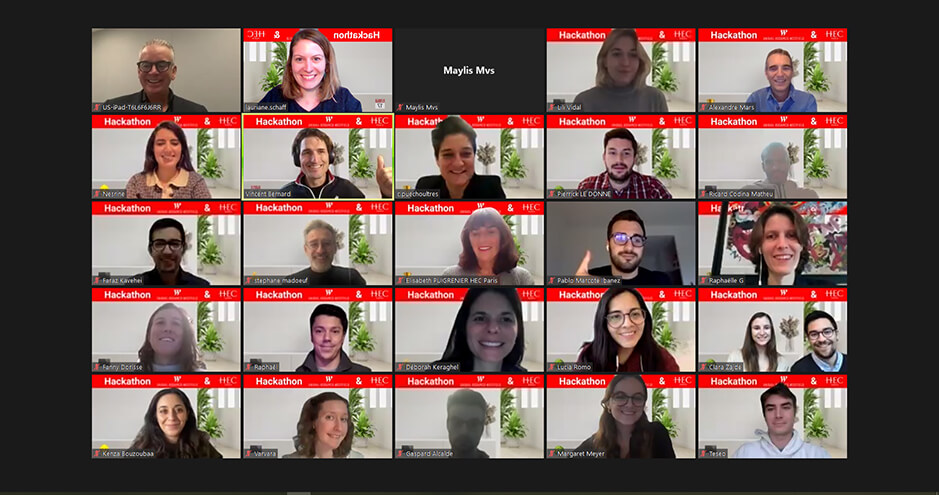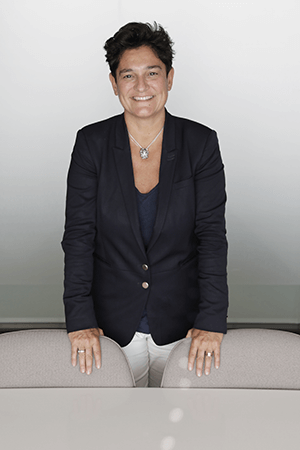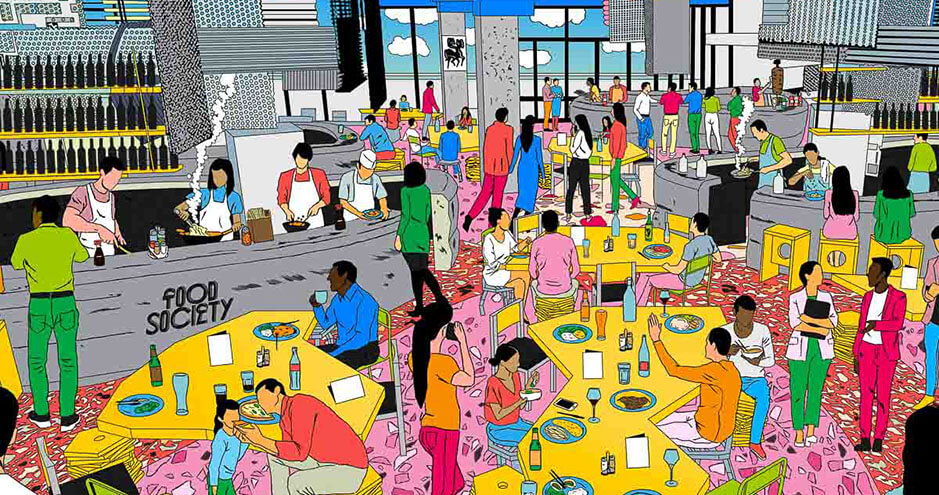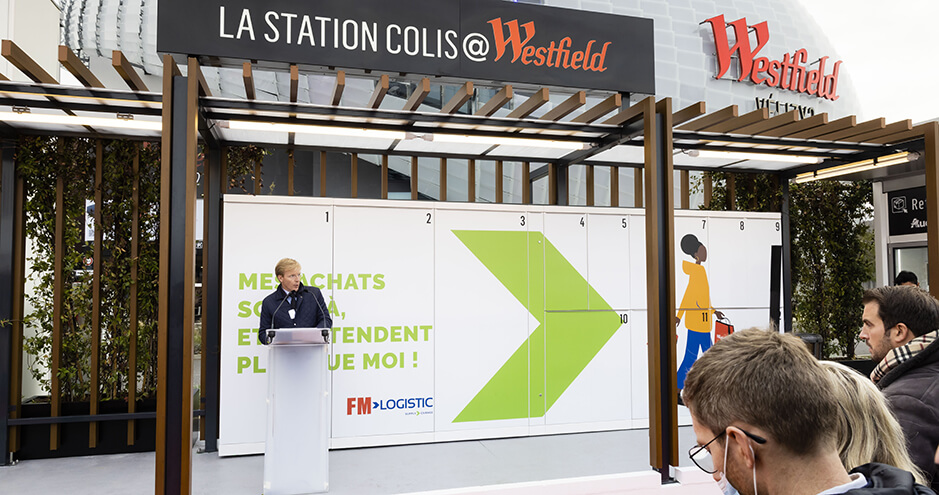HEC-URW Hackathon: an Invaluable Vision of How Professionals Work
HEC’s fourth Unibail-Rodamco-Westfield Hackathon was another rousing success for the participants and jury in this annual event. This 2022 version had students vying with each other over the topic: “My Shopping Journey – Online-offline Integrated Customer Experience.” Students from the MSc Sustainability & Social Innovation, and Digital & Entrepreneurship Majors walked off with the prizes in a hotly-contested competition.
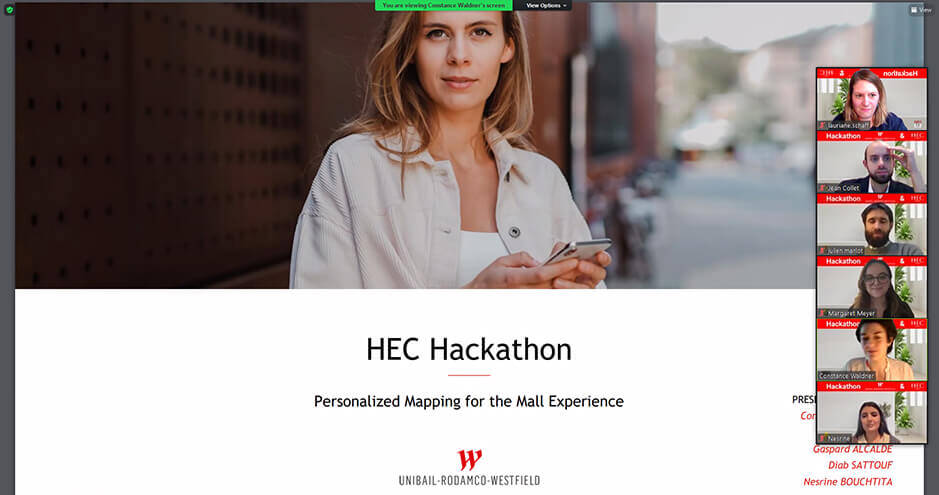
Eight teams of five vied for the three awards, as jury members sought out the most dynamic and original presentations reflecting online-offline customer dynamics. Team 8 bagged the €2,500 first prize thanks to a presentation entitled “Personalized Mapping for the Mall Experience”. The runners-up dealt with integrated personal shopping service and the connections between customers and the Metaverse.
Amongst the jury members was HEC alumnus and Chief Customer Officer at URW, Caroline Puechoultres. She shared her thoughts with us after the 2022 final.
(© Unibail Rodamco Westfield)
Following the success of last year’s Hackathon, this fourth edition focused on the ways digitalization is transforming physical trade. What do you take home from the experience?
Caroline Puechoultres: All in all, there were a lot of very interesting and fresh ideas which had one thing in common: a very high level of initiative. I enjoyed the freshness of the proposals, and the fact that they provided original features or angles. For example, the exploration of social aspects to enhance consumer experience with friends, providing kid-friendly environment, the promotion of sustainable consumption, and so on. We also had more outlandish proposals, including meta corners in our shopping malls!
Are there certain presentations/ideas that you could imagine using at Unibail-Rodamco-Westfield – URW?
These ideas definitely fit into our roadmap – some longer-term than others – and we will be drawing inspiration from them, as they demonstrate they are relevant to our business.
How does this Hackathon compare to the experiences you enjoyed 31 years ago when you graduated from here?
Had such projects existed in my time at HEC, I would have gladly participated! It is a great privilege to be able to work on an intensive two-day project that is so close to the real-life business of a company, with a diverse team (in terms of nationality and HEC major) and the 3 HEC majors Sustainability and Social Innovation, X-Entrepreneurs and Digital. Overall, 13 URW professionals were involved in the project and gave feedback to the participants. Students are lucky that HEC’s teachings are moving closer to the companies that will hire them, as it allows them to have a peek into the business environment. This will allow them to grow their network and make informed decisions when applying for their first job.
As Chief Customer Officer at URW, you are in charge of digital innovation and the customer experience. How do you balance the digital transformation in retail assets with the in-person customer experience, particularly in the COVID era?
Digital and physical are complementary, they are not opposed. Digital and e-commerce capabilities are of course a must for brick-and-mortar retailers who turn to omnichannel, but physical presence is also critical for brand experience and loyalty. Many DNVBs (ed., Digital Native Vertical Brands) open physical stores as soon as they can. Even Amazon and Google are opening stores! This is all the more so in a post-COVID world where people have a craving for physical experiences after a day of Zoom calls. This is why we are developing more and more experiential spaces such as Food Society in Westfield La Part-Dieu.
We need to be more customer-centric than ever: we need to understand our customers and their new needs, their uses and behaviors, and capitalize on the relationship we have with them to design the omnichannel experience of tomorrow. This is the case with all our stakeholders, including commercial partners, public authorities and also the employees of the Group.
At URW, what does the concept of "phygital" mean?
We try to facilitate the experience of our visitors as much as possible, and acknowledge the fact that, regardless of the interfaces we provide them, they will have an omnichannel experience. The point is to enrich this experience with Westfield-powered content thanks to our websites, our apps, our loyalty program, … and offer them services that are as relevant as possible (for example, booking a parking spot in advance). We are also working closely with our commercial partners to offer them more visibility opportunities across our phygital network: we can give them exposure on our digital and DOOH (digital-out-of-home) network, along with providing them event spaces for physical activations for a true 360° experience. Finally, we collaborate closely with our retailers to make their omnichannel operations as easy as possible by acting as hubs in the last mile logistics chain and facilitating ship-from-store or click-and-collect, as shown by the recent opening of La Station Colis@Westfield in Westfield Vélizy 2.
How will Unibail continue its digitalization, and the necessary management of customer data that it implies?
We have just appointed a Group Director of Digital Transformation, formerly Chief Digital Officer of ADP Group, to accelerate on these topics. We need to seize the post-COVID momentum and deploy new, smart offers towards our end consumers but also our commercial partners. Many projects going in this direction are on the table currently as we focus on building value off our audience of over 1 billion visits a year. We go beyond retail sales by developing new digital and data capabilities and extending our reach beyond the physical limits of the mall. In this process, we are very rigorous on data security and compliance. We have skilled legal teams including a newly-appointed Director of New Technology and Business Law, who ensure we act in the strictest compliance with GDPR and other data protection regulations.
URW is present in many countries, particularly in North America. How does it adapt its “phygital” policies and approach to the different countries, their respective laws and their diverse cultures?
Our corporate teams at the Paris headquarters are in daily contact with local teams. We make sure they provide strategic updates on a regular basis. and we welcome their ideas and initiatives. Being a company that relies on physical assets, we have to deal with diversity not only of countries, but of local areas, even different neighborhoods in the same city. Westfield Forum des Halles in Paris and Westfield Vélizy 2 each has their own customer profiles. This is what makes the challenge so interesting. It calls for thorough consumer research to identify which projects and features we can develop at a global level and which ones should be tackled locally.
We also make sure to onboard local teams from the very start. It is not uncommon, for example, to test a new service in two different shopping centers, or even two different countries, to assess the local differences in customer adoption and feedback. We make sure to develop a “test and learn” approach, try out new ideas and share our returns on experience throughout the organization.
In your opinion, how could HEC's teaching evolve to help its students understand the upheavals brought about by the digitalization of points of sale over the last ten years?
As technological evolutions speed up - take, for example, the Metaverse trend taking off at the end of 2021, that a lot of brands are now embracing - what is more important to teach is not the current state of technology or the existing opportunities, but how to spot the next ones. Browsing the news, attending the right events, meeting the right people… my 30 years of experience since I left HEC have taught me that continuous training is paramount to remain relevant in such a changing industry!
Another aspect that is often overlooked is logistics. The length, cost, or user experience of delivery are a major issue in omnichannel operations for retailers, and they are all looking for ways to optimize deliveries and returns. There is a lot of room for improvement in long-distance as well as last-mile logistics. This probably represents a lot of opportunities for new business ideas. This is why I think this topic should be tackled whenever the digitization of retail is mentioned.
Finally, I think that the more time students spend close to companies, the more they are able to understand their business and their main challenges. This is why partnerships such as the annual HEC-URW Hackathon are so valuable: students are able to envision how professionals work, how they think and how they are organized. This is very valuable especially in the retail world since they represent so many actors in the value chain: manufacturers, retailers, logisticians, commercial real estate players, tech companies, advertising companies, payment systems providers, … and many more! It is an invaluable opportunity to be able to spend some time with several of these actors to build bridges and understand future business opportunities.
